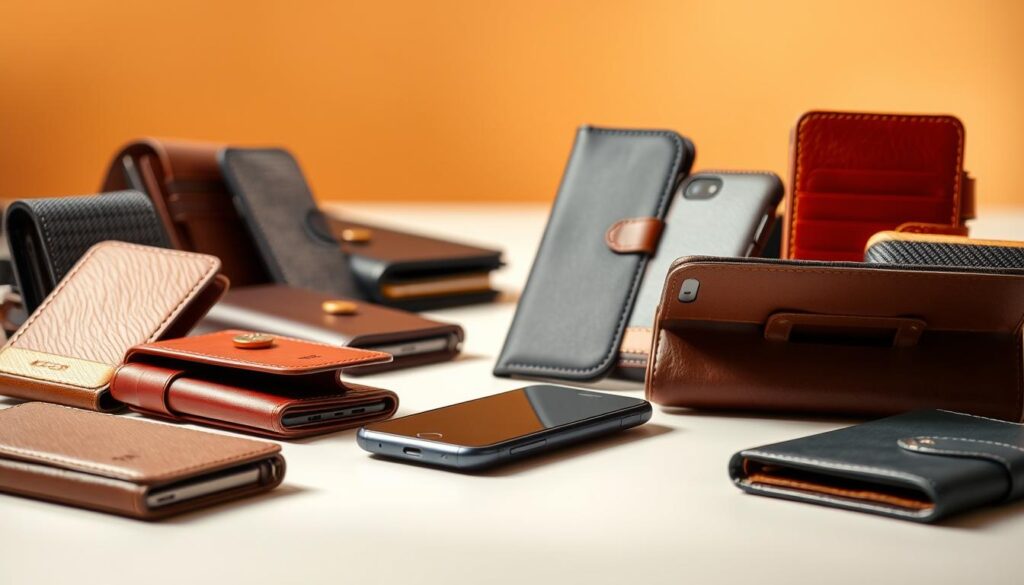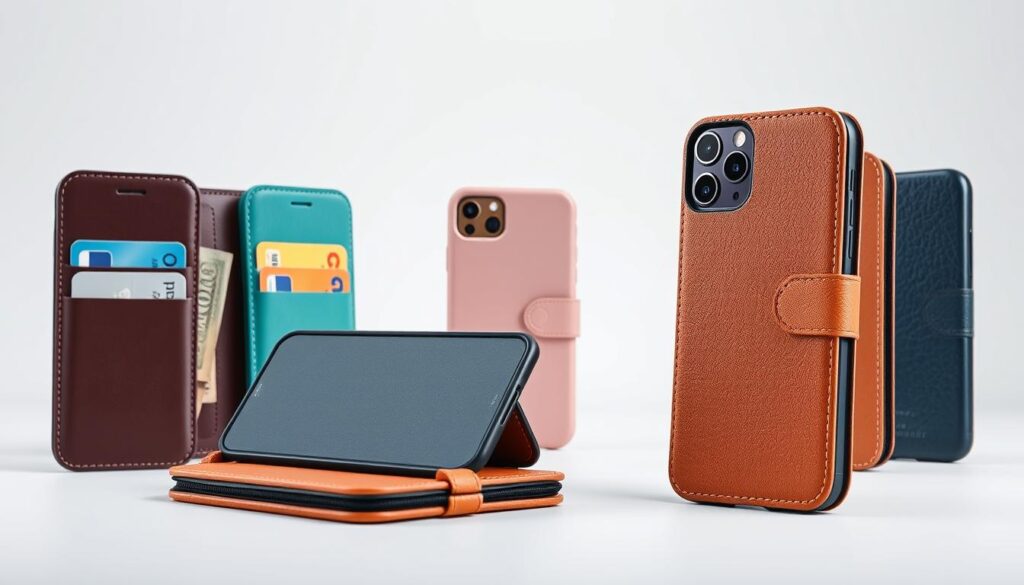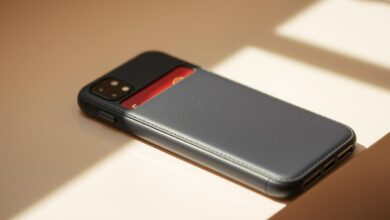Wallet Phone Case: Convenient & Fashionable Protection

I love how a phone protection and wallet combo makes my day easier. It helps me manage my daily tasks better.
A wallet phone case is both useful and trendy. It keeps my phone safe and holds my cards and cash.
Having a phone case that’s also a wallet has changed my daily life. It lets me carry less and move more smoothly.
Key Takeaways
- Combines phone protection and wallet functionality
- Offers a stylish and practical accessory for daily use
- Simplifies daily routine by reducing the number of items to carry
- Provides storage for essential cards and cash
- Available in various designs and styles to suit personal preferences
What is a Wallet Phone Case?
In today’s fast world, a wallet phone case is both handy and stylish. It protects your phone and holds your cards and cash.
Definition and Functionality
A wallet phone case is a phone case with a wallet built in. It lets you carry your phone, cards, ID, and cash together. It’s great for those who like simple, convenient things.
It has card slots, a cash compartment, and sometimes a phone stand. For more on wallet phone cases, check out this article on why you should get a wallet phone.
Types of Wallet Phone Cases
There are many wallet phone cases out there. They cater to different tastes and needs. Here are some common ones:
- Leather Wallet Cases: They’re tough and look classic, making them a favorite.
- Wallet Cases with Multiple Card Slots: Perfect for carrying lots of cards.
- Wallet Cases with Cash Compartments: They keep your cash safe and sound.
- Wallet Cases with Phone Stands: They let you watch videos without using your hands.
When picking a wallet phone case, think about the material, design, and features you need. For example, if you want something stylish, look for a wallet case with cool patterns or colors. If you need something tough, go for a rugged case.
Knowing about the different wallet phone cases helps you choose the right one. It should fit your style and needs perfectly.
Benefits of Using a Wallet Phone Case
A wallet phone case is more than a cover; it’s a tool for organization and style. It combines several functions into one, making daily life easier.
Protection for Your Phone
One key benefit is the protection it offers for your phone. Its sturdy design and materials shield your device from scratches, drops, and damage. Many cases have a raised edge to protect the screen when placed face down.
Organizing Essentials
A wallet phone case helps you stay organized. It has slots for cards and cash, so you can carry everything in one place. This means you can say goodbye to a bulky wallet.
Users say it simplifies their day by reducing items to carry. For more on the pros and cons, check out this detailed review.
Minimalism and Convenience
A wallet phone case combines a case and wallet, promoting minimalism and convenience. It simplifies your carry, making it easier to manage your stuff. One user said, “Using a wallet phone case has been a game-changer; I no longer need to worry about losing my wallet or phone.”
- Reduces clutter by consolidating items
- Enhances convenience with easy access to cards and cash
- Promotes a minimalist lifestyle by reducing the need for multiple accessories
In conclusion, wallet phone cases offer protection, organization, and convenience. They simplify your daily carry and protect your phone. They’re a practical solution for anyone looking to streamline their life.
Stylish Designs for Every Personality
Wallet phone cases are more than just protection. They let you show off your style. With so many designs, you can find a case that fits your taste and keeps your phone safe.
Leather wallet cases are a timeless choice. Leather wallet cases are durable and elegant. They come in many colors, so you can pick the perfect one for you.
Classic Leather Wallet Cases
Leather wallet cases are a classic choice. They are stylish and offer great protection. The leather is strong and can handle daily use.
Leather wallet cases have many benefits:
- Durability: Leather is strong and lasts long.
- Elegance: They look sophisticated and stylish.
- Variety: There are many colors and designs to choose from.
Trendy Patterns and Colors
For a bold look, try a wallet phone case with trendy patterns and colors. You can find cases with stripes, geometric designs, and more. These cases are great for those who love staying trendy.
Some popular trends include:
| Trend | Description |
|---|---|
| Bright Colors | Vibrant colors that add a pop to your phone. |
| Geometric Patterns | Modern designs that add a unique touch. |
| Abstract Art | Creative designs that make your phone stand out. |
Customized Options
For a truly unique case, go for customized options. Many brands let you personalize your case with your name, initials, or favorite design. This makes your case special and adds a personal touch.
Whether you like leather, trendy designs, or something custom, there’s a case for you. Choosing a case that shows your personality means your phone is both safe and stylish.
Top Brands for Wallet Phone Cases
Many brands lead the wallet phone case market. They are known for quality, durability, and style. These features make them stand out.
OtterBox: The Durable Choice
OtterBox is famous for tough phone cases. Their wallet cases are no different. They protect your phone well.
OtterBox offers various styles. You can find cases with card slots and cash compartments. They are practical for carrying essentials.
Speck: Sleek and Stylish
Speck is known for stylish and functional wallet cases. They have slim designs and many colors. This appeals to those who like both looks and function.
Speck’s cases are stylish and protect your phone. They are perfect for those who want a phone holder that looks good.
Mujjo: Premium Leather Options
Mujjo offers premium leather wallet phone cases. They are elegant and sophisticated. The leather gets better with time.
Mujjo’s cases are stylish and practical. They have many card slots and a secure closure.
Choosing a wallet phone case means looking at the brand’s quality and durability. The mentioned brands are just a few great options. For more, check out Best Products.
| Brand | Key Features | Price Range |
|---|---|---|
| OtterBox | Durable, rugged, card slots | $30-$50 |
| Speck | Sleek designs, slim profile, variety of colors | $20-$40 |
| Mujjo | Premium leather, elegant designs, multiple card slots | $40-$60 |

How to Choose the Right Wallet Phone Case
Choosing the right wallet phone case is important. You want one that protects your phone and fits your lifestyle. There are many options out there.
Compatibility with Your Phone Model
First, make sure the case fits your phone. Check if it’s made for your phone’s brand and model. It should cover the camera and charging port well.
- Verify the case’s dimensions and cutouts match your phone’s specifications.
- Consider the material and build quality to ensure durability.
- Check for any additional features such as card slots or a cash compartment.
Consider Your Style Preference
Your wallet phone case is more than just protection. It’s a fashion statement. Think about your style when picking a case.
Here are some popular styles:
- Classic Leather: Leather cases are timeless and elegant.
- Trendy Patterns and Colors: For the latest trends, choose a case with bold designs or bright colors.
- Customized Options: For a unique look, go for a customized case that shows off your personality.
Storage Capacity Needs
Think about how many cards you carry. Do you need a spot for cash?
- Choose a case with enough card slots for your essential cards.
- If you carry cash, find a case with a cash slot.
- Some cases have extra spots for your ID or loyalty cards.
By considering these points, you can find a wallet phone case that’s right for you. It will protect your phone and match your style.
Care Tips for Your Wallet Phone Case
Keeping your wallet phone case in good shape is key. It keeps your phone safe and looking good. A well-maintained case is both functional and stylish.

Cleaning and Maintenance
Use a soft, dry cloth to clean your case often. For stubborn stains, dampen the cloth a bit with water. But, stay away from harsh chemicals or rough cleaners that can harm the material.
Regular cleaning stops dirt and grime from building up. This keeps the case strong. If your case is leather, use a leather conditioner to keep it soft and prevent it from cracking.
Avoiding Damage
Don’t let your case get too hot or wet. Leaving it in a hot car or getting it soaked in rain can damage it.
Also, be careful when you hold your phone in the case. Dropping it or pressing too hard can hurt the case and your phone. A wallet phone case with strong design and corners can help protect it.
By following these easy care tips, your wallet phone case will stay in top shape. It will keep your phone protected and looking good for a long time.
Accessories to Enhance Your Wallet Phone Case
Adding the right accessories can make your wallet phone case better. You can make it more useful and stylish. A few thoughtful additions can really boost its value.
RFID Blocking Technology
RFID blocking technology is a great addition. It keeps your credit cards safe from thieves. This feature stops unauthorized scanning, keeping your financial info secure.
Benefits of RFID Blocking Technology:
- Protects against credit card skimming
- Prevents identity theft
- Provides peace of mind
Detachable Straps
Detachable straps are also a good choice. They let you wear your phone case around your neck or wrist. This is perfect for staying hands-free during workouts or travel.
Popular uses for detachable straps include:
- Fitness enthusiasts who need hands-free access to their phone
- Travelers who want to keep their phone secure while exploring
- Individuals who enjoy outdoor activities like hiking or biking
Phone Charms and Personalized Add-ons
For those who love personal touches, phone charms and add-ons are great. They let you show off your style with charms or monograms. You can add elegance or whimsy, depending on your taste.
| Accessory | Description | Benefit |
|---|---|---|
| RFID Blocking Technology | Blocks unauthorized RFID scans | Enhanced security |
| Detachable Straps | Allows hands-free phone carrying | Increased convenience |
| Phone Charms | Personalized decorative accessories | Unique personal expression |
Adding these accessories to your wallet phone case makes it more useful and stylish. Whether you want to improve its function or look, there’s something for everyone.
Wallet Phone Cases vs. Traditional Cases
There are many phone case options out there. It’s important to compare wallet phone cases to traditional cases to find the best one for you. The choice depends on what you need, like protection, style, and how easy it is to use every day.
Functionality Comparison
Wallet phone cases and traditional cases are different in what they offer. A wallet case protects your phone and also holds your cards and cash. This makes it a 2-in-1 solution. Traditional cases just protect your phone.
Here are some key differences:
- Storage capacity: Wallet cases can hold many cards and sometimes cash. Traditional cases don’t have this feature.
- Protection level: Both offer protection, but wallet cases might be more protective because they’re thicker.
- Convenience: Wallet cases are more convenient because they combine a phone case and a wallet.

Aesthetic Appeal
Wallet phone cases and traditional cases look different. Wallet cases come in many designs, from slim to rugged. Traditional cases are simpler and let the phone’s design show.
Some things to think about:
- Design variety: Wallet cases have many designs, including different materials and patterns.
- Style: Traditional cases are more simple, keeping the phone’s look.
- Personalization: Wallet cases can be personalized with card slots and cash compartments.
Practicality for Daily Use
Practicality is key when choosing between a wallet phone case and a traditional case. Wallet cases are great for daily use because they hold your phone, cards, and cash together. This means you don’t need to carry a separate wallet.
Consider these points:
- Ease of use: Wallet cases might be thicker, making them harder to fit in small pockets.
- Accessibility: Having your cards and cash with your phone is convenient but makes your phone thicker.
- Security: Some wallet cases have extra security features like RFID blocking.
In conclusion, choosing between a wallet phone case and a traditional case depends on what you value most. Think about functionality, style, and practicality. This will help you pick the right case for your lifestyle and preferences.
Customer Reviews and Experiences
Users’ feedback on wallet phone cases is very helpful. It shows how well these cases work and look in real life. People share their thoughts, giving us a clear view of what’s good and what’s not.
Popular Opinions on Durability
Many say wallet phone cases are tough. They protect phones from scratches and drops well. For example, a review on a wallet case for iPhone praised its strong build and ability to handle daily use.
Some find that leather cases get softer and more comfortable over time. But, cheaper materials might not last as long, leading to disappointment.
Style Satisfaction Ratings
Style matters a lot, and wallet phone cases offer many options. People like the variety, from classic leather to bold patterns and colors. The chance to customize some cases is also a big plus for those who want something unique.
A table below shows how people feel about the styles:
| Design Type | Average Rating | Common Feedback |
|---|---|---|
| Leather | 4.5/5 | Durable, classic look |
| Patterned | 4.2/5 | Unique, stylish |
| Customizable | 4.8/5 | Personalized touch |
Real-Life Usage Scenarios
In everyday use, wallet phone cases are very handy. They keep phones, cards, and cash together. For example, people who commute find it easier to carry everything in one place.
But, some say the extra bulk is a problem, especially for those with small phones or pockets. Still, most think the benefits of having a wallet case are worth it.
As wallet phone cases keep getting better, customer feedback is key. It helps makers improve their products, making them more useful and attractive.
Where to Buy the Best Wallet Phone Cases
Finding the perfect wallet phone case can be tough. But knowing where to look makes it easier. I’ve found the best places to buy wallet phone cases, and I’m excited to share them with you.
Online Retailers
Online stores like Amazon, Best Buy, and Walmart have a wide range of wallet phone cases. They also have customer reviews to help you choose. This makes it easier to pick the right phone holder or wallet phone case.
Local Stores and Boutiques
Local stores and boutiques are also great places to find unique wallet phone cases. Apple and Target, for example, carry many options. You can buy them right in the store.
Seasonal Sales and Discounts
Watch for seasonal sales and discounts online and in-store. Retailers often have deals during holidays like Black Friday and Cyber Monday. This is a great time to find wallet phone cases at lower prices.
FAQ
What is a wallet phone case?
A wallet phone case is a protective case that holds your phone and wallet. It keeps your cards, cash, and other essentials safe.
What types of wallet phone cases are available?
There are many wallet phone cases out there. You can find ones with card slots, cash compartments, and even phone stands. They come in leather, silicone, and plastic.
What are the benefits of using a wallet phone case?
Wallet phone cases protect your phone and keep your essentials organized. They also help you carry less, making life simpler.
How do I choose the right wallet phone case for my phone?
To pick the right case, think about your phone model, style, and how much you need to carry. This will help you find the perfect fit.
How do I care for my wallet phone case?
To keep your case in good shape, clean it with a soft cloth. Stay away from harsh chemicals and handle it gently to avoid damage.
Can I customize my wallet phone case?
Yes, some brands like Mujjo let you customize your case. You can choose from different designs, colors, and materials.
Are wallet phone cases compatible with RFID blocking technology?
Yes, some cases have RFID blocking technology. This adds an extra layer of security against credit card skimming.
How do wallet phone cases compare to traditional phone cases?
Wallet cases offer more than traditional cases. They have storage for cards and cash but might be bulkier. Traditional cases are simpler and more minimalist.
Where can I buy wallet phone cases?
You can find wallet phone cases online, in local stores, and boutiques. Keep an eye out for sales and discounts for the best deals.
What are some top brands for wallet phone cases?
Top brands include OtterBox, Speck, and Mujjo. They’re known for their durability, sleek designs, and premium leather options.



